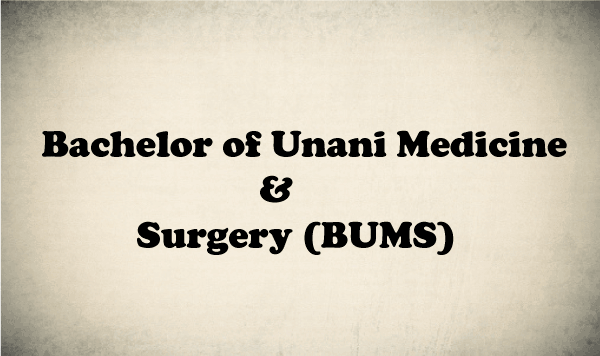
Bachelor of Unani Medicine and Surgery (BUMS) is an undergraduate degree in the field of Unani medicine, a traditional healing system with roots in ancient Greece, later developed by Persian and Arab scholars. Unani medicine is based on the concept of balancing the four humors (blood, phlegm, yellow bile, and black bile) for good health. The BUMS program trains students in this holistic approach, which combines natural healing methods with modern medical science.
1. Program Duration:
- The BUMS course is typically 5.5 years, consisting of:
- 4.5 years of academic coursework.
- 1-year compulsory internship in a hospital, clinic, or health center.
2. Admission Requirements:
- Educational Qualifications:
- Successful completion of 12th grade with a focus on Physics, Chemistry, and Biology.
- Knowledge of Urdu may be required as some of the Unani texts are in Urdu or Arabic.
- Students may need to qualify for entrance exams like NEET or specific exams conducted by universities offering BUMS.
3. Core Curriculum:
The BUMS program integrates classical Unani medicine with elements of modern medicine. Below is an outline of the curriculum:
a. First Professional Year:
The initial year focuses on basic sciences and the principles of Unani medicine.
- Tashreeh-ul-Badan (Anatomy): Study of human anatomy in relation to Unani principles.
- Munafe-ul-Aza (Physiology): Understanding the function of the human body based on Unani concepts.
- Kulliyat-e-Tib (Principles of Unani Medicine): Basic principles and philosophies of Unani medicine.
- Tahaffuzi-wa-Samaji Tib (Preventive and Social Medicine): Emphasis on hygiene, disease prevention, and public health from a Unani perspective.
b. Second Professional Year:
Focuses on pharmacology, pathology, and further Unani principles.
- Ilmul Advia (Pharmacology): Study of Unani drugs, medicinal plants, and formulations.
- Ilmul Amraz (Pathology): The study of diseases and their causes, symptoms, and treatment in Unani medicine.
- Ilmul Saidla (Pharmacy): Preparation and dispensing of Unani medicines.
- Toxicology: Understanding toxins and their antidotes according to Unani teachings.
c. Third Professional Year:
In this phase, students are introduced to clinical aspects and practical applications.
- Moalajat (General Medicine): Diagnosis and treatment of various diseases using Unani principles.
- Ilmul Jarahat (Surgery): Basic concepts of surgery in Unani medicine.
- Amraz-e-Niswan (Gynecology and Obstetrics): Unani approach to female reproductive health and childbirth.
- Ilmul Atfal (Pediatrics): Study of child health and diseases from a Unani perspective.
d. Fourth Professional Year:
The final year focuses on clinical practice and specialized areas.
- Ilaj-bit-Tadbeer (Regimental Therapy): Non-drug treatments like cupping, massage, leeching, venesection, etc.
- Amraz-e-Jild wa Tazeeniyat (Skin Diseases and Cosmetology): Treatment of skin conditions and beauty care in Unani medicine.
- Ain, Uzn, Anaf wa Halaq (ENT and Ophthalmology): Study of diseases related to eyes, ears, nose, and throat.
- Tashreeh wa Ilmul Amraz (Forensic Medicine and Toxicology): Legal aspects and Unani forensic medicine.
e. Internship:
The final year consists of a one-year compulsory internship, where students work in hospitals or healthcare settings to gain practical experience in diagnosing and treating patients using Unani medicine.
4. Skills Developed in BUMS:
- Patient Assessment: Identifying symptoms and evaluating the health status based on Unani principles.
- Holistic Treatment: Learning how to restore balance in the body's humors using natural remedies, dietary advice, and lifestyle changes.
- Pharmacognosy: Study of medicinal plants and preparation of herbal formulations.
- Surgical Techniques: Basic surgical knowledge and procedures as per Unani practices.
5. Specializations in Unani Medicine:
Upon completing the BUMS degree, students can pursue postgraduate studies in areas such as:
- Moalajat (Medicine)
- Ilmul Qabalat wa Amraz-e-Niswan (Gynecology)
- Ilmul Jarahat (Surgery)
- Tahaffuzi-wa-Samaji Tib (Preventive and Social Medicine)
- Kulliyat (Fundamentals of Unani Medicine)
6. Career Opportunities:
After completing BUMS, graduates can explore a variety of career paths:
- Unani Practitioner: Work in private practice, hospitals, or Unani clinics treating patients using traditional methods.
- Government Healthcare Jobs: Work as a medical officer in government hospitals or rural health centers.
- Pharmacist: Work in pharmaceutical companies involved in the production of Unani medicines.
- Lecturer/Professor: Teach Unani medicine in colleges and universities.
- Researcher: Engage in research and development in traditional medicine, including drug development and clinical trials.
- Health Inspector: Work in public health departments focusing on preventive measures and health awareness.
7. Postgraduate Studies:
Graduates of BUMS can pursue a Master's in Unani Medicine (MD in Unani) in various specialties. After an MD, opportunities in academic and research fields open up, as well as higher positions in hospitals and clinics.
8. Accreditation and Licensing:
- BUMS programs are regulated by the Central Council of Indian Medicine (CCIM) or similar authorities in various countries.
- After completing the degree, graduates must register with a recognized medical board to practice as a licensed Unani physician.
9. Licensure:
In some countries, practitioners of Unani medicine must obtain a license or certification after completing their BUMS degree and may need to pass an additional examination, depending on local regulations.
